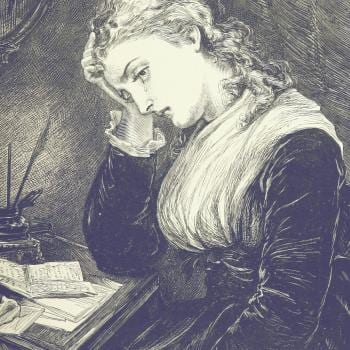Spent most of yesterday making a small mountain of food, all from an old book called Pies and Pastries—one of those lovely tomes ennobled by clear, bright, perfect pictures of various pies and dumplings and tarts. The oldest child (now 20) thought we should attempt various confections we never have time or inclination to try. Those included an apricot tart (too sweet, I think), plum dumplings, palmiers, puff pastry squares surmounted with bacon and mushroom, a quiche, and—to stretch me to the limit—salmon “en croute” which just means “in dough.” None of it came out looking like the pictures, tragically, but the salmon (I was not able to accomplish the complicated shape of an actual fish) was delicious, as well as the plum dumplings and the mushroom puffs. The apricot tart, I think, is worth trying again just to recalibrate the sugar.
The second part of the festivities included lying around for three hours trying to agree on a movie. This happens to us all the time because we’ve basically seen everything we care about, and also, everyone is so contrary. After not being able to watch the only one we were interested in, I think because we live in the wrong country, we settled on buying one episode of the new All Creatures Great and Small. We didn’t have very high hopes because it was made fairly recently, but we were prepared to be as happy as possible.
Unfortunately, it was just like every single thing made in the last five years, depressingly so. And to confirm this fact, we went back and watched the first episode of the original series. The difference was, well, not astonishing because we totally expected it, but instructive. Here are some of the differences and my feelings about them. I think they illuminate the problem with everything (think of it as a grand unified theory of how exactly we are doomed).
One
The second series, in an effort (I imagine) not to offend original lovers of the first series, based their efforts on the first series rather than the book itself, which made the episode feel both stale and stressful at the same time. Why did they do this? Perhaps to be respectful, but probably because reading comprehension is a lost skill that no one possesses anymore.
Two
Attempting to build in narrative suspense, the second series begins with young Herri0t in Glasgow getting a letter from Farnon offering him an interview. But the writers and directors know we viewers are all dumber than bags of hammers, and that we may not understand how anxious a thing it is to be looking for jobs when there aren’t that many. So they have young Herri0t’s mother pressuring him to “give up his dreams” and “go work on the docks.” In contrast to her anxiety, the meek and tender father encourages young Herri0t to go after those dreams after all. Because, you know, the you-running-after-your-dream motif has to still be shoved down the gullet of every single tv show and movie, even though it has been shown to be a foolish and impossible idea, and full of tragedy along the way. But we have to have it, because we do. It’s like a religious creed, only one that is much more boring, communicating no mystery or transcendent meaning whatsoever.
The creators of the series, however, by shoving young Herri0t on a train and making him say goodbye to his mother and his dog, ruin the very charm of the work, which is that Herri0t arrives in a small town and suddenly takes up a whole life, complete and enchanting in all its contours. His past doesn’t come into it, except obliquely referenced here and there (Glasgow). The effect of those initial scenes, for me, as a mother, as it were, is that they did provide suspense, but of the wrong kind. Instead of being happy and settled and sorted in Yorkshire, vicariously as it were, I sat there wondering in which episode (which I won’t be paying for) “young” Herri0t would write to his mother to have his dog sent on. Which one is it? And why did they have to do that? And why doesn’t Siegfried have a pack of hounds in his own car anyway? Why is there only one dog in Yorkshire?
Three
Which brings me to my main criticism. In the original series, the actors—and this might amaze you—have the simple and understandable job of playing the characters in the series. I can’t remember any of the actors’ names, but there is James, of course, and Tristan and Siegfried and Mrs. Hall, etc. Not only are all the actors of different ages and of varying levels of attractiveness, they are, how does one say it? Embodied? The actors playing James and Siegfried are only having to play James and Siegfried. That is their only task.
But in the new series, all the actors are having to play men and women playing their various parts. Another level of work has been added to the job of the actor. This, I think, is because the kind of men who lived way back then (what, like fifty years ago? eye-roll) apparently are incomprehensible to us now, so there has to be a sort of caricature-esque overlay, as well as lots and lots of weird explanatory moments that make the dialogue stilted, embarrassing, and weirdly dry. All the humor had to be taken away to make room for ques about what men in the past used to be like. Herri0t , for example, won’t be able on his own to figure out what sort of person Siegfried is, Mrs. Hall has to clue him in.
Just as an aside, Mrs. Hall is far too young. It’s so ridiculous that all the actors look exactly the same age. Really, badly done on the casting effort, badly done.
Maybe the acting and writing get smoother in later episodes, but, as I said, I probably won’t be paying to hate-watch them all. What I find so interesting, however, is that the modern idea of what it means to be a man has, however subtly, radically shifted. The comedic timing of the first series is so wonderful because James and Siegfried are aggressive. They take risks. They don’t have to explain themselves. They exercise restraint. Basically, all the stuff that has historically been the property of masculinity until recently drives the plot and humor forward. Of course, the original writers didn’t wake up and say that, because it was the pond we were all swimming in. But we are no longer swimming in it, and so, to make themselves comfortable (I bet) the new writers and directors provide historical and social commentary by way of overdoing the drama of even being a man.
Likewise, there is the question of Mrs. Hall. In the first series, she is testy rather than scolding. This is a big deal in the consideration of that bygone category of “femininity.” The old Mrs. Hall treats all the men as if they are adult people. She is older than them but she doesn’t act like their mother. The new Mrs. Hall babies and scolds everybody. Siegfried really needs to worry about his health because he’s exhausting himself (hard to believe since he looks exactly the same age as young Herri0t ). Herri0t needs to put himself out there and take risks and it’s not his fault that he couldn’t hold his liquor and so rearranged the cats because he’s just a young kid and not an actual man who just took a degree in veterinary medicine. No one, of course, would know to eat a proper breakfast unless Mother told them to. Knowing that you, the viewer, are, as I said, dumber than a bag of hammers, Mrs. Hall ‘splains all the essentials thereby turning Harriet and Siegfried into children as dumb and helpless as the audience.
In conclusion, I’m sad about almost all television created today. This series could have been good, but it appears that the creators mistook various superficial aesthetic details—smoking a pipe at the right time while driving in the car, for example, and the shape and color of the bus—for what truly made the original series a classic, which was the good writing and acting. If a modern person would try making a movie or a TV series that wasn’t religious propaganda for the ideological thought du jour, I would be so delighted to plunk my money down and watch it.
Photo by Illiya Vjestica on Unsplash













